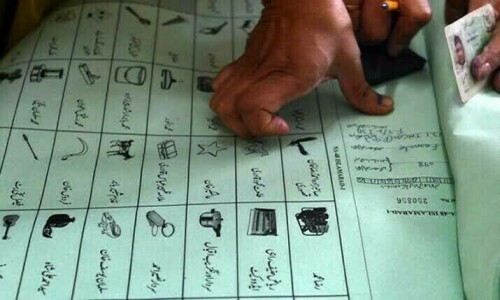PAKISTAN’S stock market has a much better idea than our policymakers about what has actually hit the global economy in the shape of US ‘reciprocal’ tariffs.
The nation’s equity market took a severe drubbing on Monday, plummeting 7.31pc at one point despite a pause in trading triggered by activation of circuit breakers to prevent panic selling and extreme volatility, following a steep drop in stock valuations during the morning session.
Although the PSX managed to claw back some of the losses later in the day, its bearish response to President Donald Trump’s tariffs shows that fears of recession worldwide weighed on investors’ minds more than the comfort offered by Finance Minister Muhammad Aurangzeb’s optimism that punitive tariffs could be turned into a win-win situation for both countries. “You should never let a good crisis go to waste. We are looking at it both as a challenge as well as an opportunity,” the minister said on Saturday.
But, it is one thing to be optimistic and another to be discerning. The minister, and a lot of businesspeople, are hopeful of offering the White House something in the shape of reduced or zero taxes on imports from the US besides boosting purchases from American exporters to get tariff concessions from the Trump administration. They also believe that the country’s exporters would gain rather than lose by the US action since its competitors like Vietnam, Bangladesh, Cambodia, etc have been slapped with steeper import taxes.
It is not clear how our policymakers and businesspersons plan to gain a bigger market share in the US as we do not produce the high-quality garments and textiles as well as other products our rivals sell to the US. Nor is it clear how our decision makers plan to meet President Trump’s demand from all foreign countries to shrink their trade surpluses with the US. Global market turmoil notwithstanding, America’s leader has made it clear that he would not make a deal with other countries unless trade deficits were solved.
It is difficult to say how the situation will unfold in the near future. But it is more or less clear that a full-blown trade war is upon us as the era of the rules-based, multilateral trading order is nearly over. With that we are entering into an arbitrary, protectionist phase where might will be right, which poses a major risk to weaker economies like ours.
The stability and clarity international trade relations had under the WTO framework would no longer be available. Even if we are able to get concessions from the US, it will not protect us from the potential negative impacts of the changes spawned by the rejection of rules-based trading by the world’s biggest economy. Optimism is welcome but we should also be clear-eyed and prepared to brace ourselves for the possible shocks to come.
Published in Dawn, April 8th, 2025













































